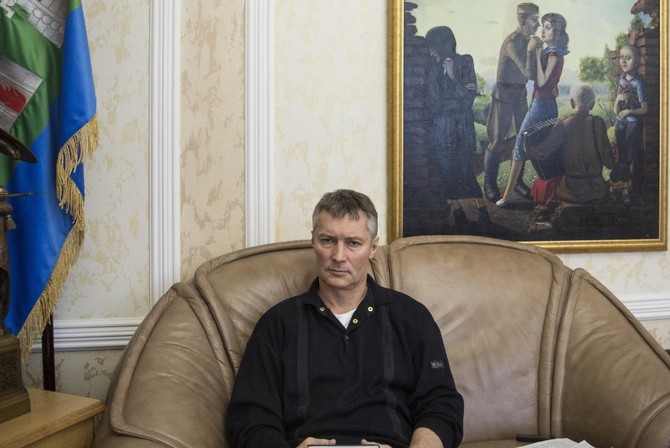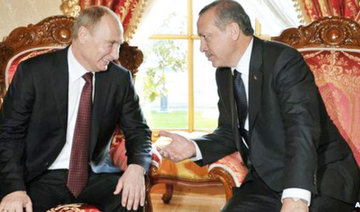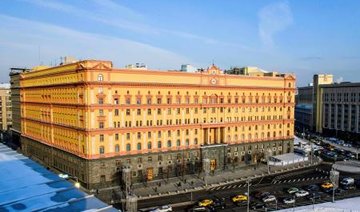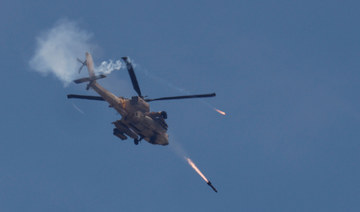MOSCOW: In Russia, where all governors and mayors are either Kremlin nominees or hail from Kremlin-friendly parties, Yevgeny Roizman cuts an odd figure.
The mayor of Yekaterinburg, Russia’s fourth-largest city with 1.4 million people, is the only top regional official to openly criticize President Vladimir Putin. He has also called for a boycott of Sunday’s presidential vote, a move advocated by Russian opposition leader Alexei Navalny, who is banned from running.
Yet Roizman still epitomizes the helplessness of Russia’s opposition in the face of Putin’s well-oiled government machine.
Roizman is an outlier in Putin’s system of government, where every official — from a village chief to the governor — explicitly answers to and serves the Russian president.
While millions of public workers are busy rooting for Putin and urging residents to vote, Roizman has dismissed the presidential vote as sham.
“You can ask anyone and everyone will tell you who is going to win this election. What’s the point in going to vote then?” he told The Associated Press.
But making public statements is the only thing Roizman is free to do. In the president’s “power vertical,” as Putin once named it, if those who oppose him are not already sidelined or jailed, they simply have no executive powers or budgets to take on the Kremlin.
A former convict and leader of a vigilante anti-drug movement, 55-year-old Roizman might seem unelectable. But in his hometown of Yekaterinburg in the Urals, he won a tight mayoral race against a pro-government candidate in 2013.
A visitor to Roizman’s office is immediately struck by the glaring absence of the one requisite symbol of power in Russia: a portrait of Putin. On his first day, Roizman hung a portrait of dissident poet Josef Brodsky. His office is open, and his hour-long interview with the AP was interrupted when a retiree stepped in to complain about his low pension.
When Roizman ran for office, one of his campaign promises was to improve the quality of water in this industrial city. But once elected, Roizman realized he was unable to do that.
“I have no budget to spend,” Roizman said. “The city has been stripped of its major powers, its major sources of income.”
Like other regional capitals, Yekaterinburg in the 2000s fell victim to Putin’s “power vertical” concept, which was presented as an antidote to lawlessness and the lack of coordination between the federal government and regional authorities.
But in the end, that policy simply forced Russian regions to send most of their revenues to Moscow. Now they receive back only a fraction. The system was supposed to help economically struggling regions like the North Caucasus, but it has angered wealthier cities like Yekaterinburg and Kazan, which feel they are paying for corruption and mismanagement several time zones away.
Roizman’s background reflects Russia’s ups and downs since the 1991 fall of the Soviet Union. He spent more than two years in prison in the 1980s for robbery and fraud, something he describes as a youthful mistake.
After stints making jewelry and researching local history, Roizman made his name by forming a volunteer group to stem a drug epidemic in the Urals. Official estimates in 2003 put the number of drug users in this region of 4 million at 235,000 people.
“We had a drug catastrophe,” Roizman recalled. “Ambulances were driving around picking up corpses from the sidewalks.”
Yekaterinburg, which still has some of Russia’s highest HIV rates because of the ‘90s drug epidemic, lies on the drug route that ran from Afghanistan and Central Asia to Europe. It’s about 1,050 miles (1,700 kilometers) east of Moscow. He says the police were at best helpless to deal with the drug dealers, and at worst profiting from the drug business.
Roizman and his colleagues began to track down and round up drug dealers and set up private rehab clinics to which desperate families sent their addicted relatives. Many credit the City Without Drugs foundation for fighting Russia’s narcotics epidemic, but others remember reports of drug users locked up in rehab clinics against their will.
Roizman vehemently denies any wrongdoing and says he saved the lives of “thousands.”
His 2013 win was also improbable because of his scathing criticism of the Kremlin.
Bashing the Kremlin from the sidelines is dangerous, but doing so within the system is almost impossible. Two other regional opposition leaders have been imprisoned on charges seen as retribution for their lack of compliance.
Nikita Belykh, former governor of the Kirov region who once employed Navalny as an unpaid aide, was arrested and sentenced this year to eight years in a high-security prison for accepting 600,000 euros ($740,000) in bribes.
Yevgeny Urlashov, who won a landslide victory in Yaroslavl’s mayoral race in 2012, was arrested a year later and spent three years in jail before being found guilty of accepting bribes and sent to prison for 12 1/2 years.
The popular Urlashov, who criticized the federal government for taking away the city’s taxes, posed a tangible threat to the Kremlin, Roizman said, because he convinced supporters to take to the streets.
“That scared them,” Roizman said.
Urlashov would not cooperate with local pro-Kremlin elites, so Moscow retaliated by cutting back the city’s budget. A year later, the mayor was slapped with bribery charges that many considered fabricated.
Roizman was going to run for governor of the Yekaterinburg region last year, a position that would give him a budget to spend, but he failed to gain enough required votes from local pro-Kremlin lawmakers to field his candidacy.
Roizman says he’s glad he didn’t get to run and win because of the inevitable Faustian bargains that he says all Russian politicians face under Putin. What would happen, he asks, if Kremlin authorities summoned him and offered to build the city a second subway line in exchange for his public support of the presidential election?
“What would I do?” Roizman said. “I’m ashamed to say it but I know what I would do: I would cast my eye and say ‘Everyone should to go to vote.’ I would trade it for the second metro line.”
Now, in a visible though largely powerless position, the only thing left for Roizman to do is “stay true to myself” and call for a boycott of Sunday’s presidential election.
“There will never be a fair election under this government,” he said. “They have only one goal: to stay in power forever.”
Russia’s rebel mayor calls for presidential election boycott
Russia’s rebel mayor calls for presidential election boycott

Biden administration is giving $1 billion in new weapons and ammo to Israel, congressional aides say
Biden administration is giving $1 billion in new weapons and ammo to Israel, congressional aides say

- The package being sent includes about $700 million for tank ammunition, $500 million in tactical vehicles and $60 million in mortar rounds, the aides said
- Israel has killed more than 35,000 Palestinians in Gaza, mostly women and children, according to the health ministry in the Hamas-run territory
WASHINGTON: The Biden administration has told key lawmakers it is sending a new package of more than $1 billion in arms and ammunition to Israel, three congressional aides said Tuesday.
It’s the first arms shipment to Israel to be announced by the administration since it put another arms transfer — consisting of 3,500 bombs — on hold earlier in the month. The administration has said it paused that earlier transfer to keep Israel from using the bombs in its growing offensive in the crowded southern Gaza city of Rafah.
The congressional aides spoke on condition of anonymity to discuss an arms transfer that has not yet been made public.
The package being sent includes about $700 million for tank ammunition, $500 million in tactical vehicles and $60 million in mortar rounds, the aides said.
There was no immediate indication when the arms would be sent. Israel is now seven months into its war against Hamas in Gaza.
The Wall Street Journal first reported the plans to move the package.
House Republicans were planning this week to advance a bill to mandate the delivery of offensive weaponry for Israel. Following Biden’s move to put a pause on bomb shipments last week, Republicans have been swift in their condemnation, arguing it represents the abandonment of the closest US ally in the Middle East.
The White House said Tuesday that Biden would veto the bill if it were to pass Congress. The bill also has practically no chance in the Democratic-controlled Senate. But House Democrats are somewhat divided on the issue, and roughly two dozen have signed onto a letter to the Biden administration saying they were “deeply concerned about the message” sent by pausing the bomb shipment.
In addition to the written veto threat, the White House has been in touch with various lawmakers and congressional aides about the legislation, according to an administration official.
“We strongly, strongly oppose attempts to constrain the President’s ability to deploy US security assistance consistent with US foreign policy and national security objectives,” White House press secretary Karine Jean-Pierre said this week, adding that the administration plans to spend “every last cent” appropriated by Congress in the national security supplemental package that was signed into law by Biden last month.
Court probing Ukraine, Gaza wars vows to defy threats

- Israel has killed more than 35,000 Palestinians in Gaza, according to Gaza’s Health Ministry
- In May of last year Russia put Kahn on its list of wanted persons after the court issued an arrest warrant against President Vladimir Putin for his role in the deportation of Ukrainian children to Russia as part of the war
UNITED NATIONS, United States: The International Criminal Court prosecutor said Tuesday he will not be intimidated by threats as his office probes possible war crimes in Ukraine and Gaza.
During a UN Security Council meeting on his probe into war crimes in Libya, prosecutor Karim Khan was challenged by the ambassadors of Russia and Libya, who criticized what they called his inaction as Israel wages war on Hamas in the Gaza Strip.
“One wonders if the effectiveness of the ICC on this track is affected by the fact that a new bipartisan bill has been submitted to the US Congress to sanction ICC officials involved in investigating not only the US but also its allies,” said the Russian ambassador Vasily Nebenzia.
Nebenzia was alluding to news reports that a bill to this end has been submitted to the US Congress.
Khan responded by citing what he said were threats against him and his office to make him halt his probes.
“We will not be swayed, whether it’s by warrants for my arrest or the arrest of elected officials of the court by the Russian Federation, or whether it’s by other elected officials in any other jurisdiction,” Khan said.
In May of last year Russia put Kahn on its list of wanted persons after the court issued an arrest warrant against President Vladimir Putin for his role in the deportation of Ukrainian children to Russia as part of the war.
In early May Kahn’s office said on X that the court’s “independence and impartiality are undermined, however, when individuals threaten to retaliate against the court or against court personnel.”
It did not say where the threats are coming from.
“Such threats, even not acted upon, may constitute an offense” against the ICC’s “administration of justice,” the office warned, calling for an end to such activity.
The court made this comment after US and Israeli media reports which suggested the ICC prosecutor could issue warrants against Israeli politicians including Prime Minister Benjamin Netanyahu and Hamas leaders.
“We have a duty to stand up for justice, to stand up for victims,” Kahn said Tuesday.
“And I am fully cognizant that there are Goliaths in this room. There are Goliaths with power, with influence” he said.
He added: “We have something called the law. All I can do is say that we will stand up to the best of our ability. We will stand up by the law with integrity with independence.”
Sweltering heat across Asia was 45 times more likely because of climate change, study finds

ENGALURU, India: Sizzling heat across Asia and the Middle East in late April that echoed last year’s destructive swelter was made 45 times more likely in some parts of the continent because of human-caused climate change, a study Tuesday found.
Scorching temperatures were felt across large swaths of Asia, from Gaza in the west — where over 2 million people face clean water shortages, lack of health care and other essentials due to Israeli bombardment — to the Philippines in the southeast, with many parts of the continent experiencing temperatures well above 40 degrees Celsius (104 degrees Fahrenheit) several days in a row.
The study was released by the World Weather Attribution group of scientists, who use established climate models to quickly determine whether human-caused climate change played a part in extreme weather events around the world.
In the Philippines, scientists found the heat was so extreme it would have been impossible without human-caused climate change. In parts of the Middle East, climate change increased the probability of the event by about a factor of five.
“People suffered and died when April temperatures soared in Asia,” said Friederike Otto, study author and climate scientist at Imperial College in London. “If humans continue to burn fossil fuels, the climate will continue to warm, and vulnerable people will continue to die.”
At least 28 heat-related deaths were reported in Bangladesh, as well as five in India and three in Gaza in April. Surges in heat deaths have also been reported in Thailand and the Philippines this year according to the study.
The heat also had a large impact on agriculture, causing crop damage and reduced yields, as well as on education, with school vacations having to be extended and schools closed in several countries, affecting thousands of students.
Myanmar, Laos and Vietnam broke records for their hottest April day, and the Philippines experienced its hottest night ever with a low of 29.8 degrees Celsius (85.6 degrees Fahrenheit). In India, temperatures reached as high as 46 degrees Celsius (115 degrees Fahrenheit). The month was the hottest April on record globally and the eleventh consecutive month in a row that broke the hottest month record.
Climate experts say extreme heat in South Asia during the pre-monsoon season is becoming more frequent and the study found that extreme temperatures are now about 0.85 degrees Celsius (1.5 Fahrenheit) hotter in the region because of climate change.
Internally displaced people, migrants and those in refugee camps were especially vulnerable to the searing temperatures, the study found.
“These findings in scientific terms are alarming,” said Aditya Valiathan Pillai, a heat plans expert at New Delhi-based think tank Sustainable Futures Collaborative. “But for people on the ground living in precarious conditions, it could be absolutely deadly.” Pillai was not part of the study.
Pillai said more awareness about heat risks, public and private investments to deal with increasing heat and more research on its impacts are all necessary to deal with future heat waves.
“I think heat is now among the foremost risks in terms of personal health for millions across the world as well as nations’ economic development,” he said.
Amsterdam university cancels classes after violence erupted at a pro-Palestinian rally

- Israel has killed more than 35,000 Palestinians, according to Gaza’s Health Ministry
- The protest was one of many that sprung up around Europe following rallies across college campuses in the United States
THE HAGUE: The University of Amsterdam canceled classes Tuesday and shut buildings for two days after the latest pro-Palestinian demonstrations over the war in Gaza turned destructive.
Protests continued to simmer at several European universities where students faced off with academic authorities on whether relations with Israel should be broken off or drastically reduced, as the death toll continues to climb during the seven-month Israel-Hamas war.
Overall, the protests in Europe have failed to reach the intensity of demonstrations at several US universities.
In the Netherlands, the board at the nearly 400-year old University of Amsterdam issued a statement saying it could not guarantee the safety of anyone on campus after a group of masked agitators barricaded doors and spray painted slogans on the walls.
The mayhem on Monday followed a peaceful walkout of staff and students against the Israel-Hamas war and the university’s response to earlier protests.
“They (the university) called in the police after people wouldn’t remove their face coverings but the police came in balaclavas,” political science professor Enzo Rossio told The Associated Press, describing Monday’s events. He had returned to his office following the walkout, only for the building to be evacuated minutes later.
While standing outside the building, Rossio said he and his wife, who also works for the university, were repeatedly hit by police with batons.
Last week, police used a bulldozer to evict demonstrators from an encampment established by students who want the university to cut ties with Israel. The protest was one of many that sprung up around Europe following rallies across college campuses in the United States.
Smaller demonstrations have taken place against the war, both at the University of Amsterdam and at other Dutch universities. But last week’s protest grew into the thousands, with demonstrators chanting slogans including, “Palestine will be free!” and “Cops off campus!”
Riot police were called in multiple times to end the demonstrations, leading to aggressive confrontations. “I’ve never witnessed this kind of violence,” history student Marin Kuijt said in an interview. Kuijt said he had regularly attended climate change marches and joined the walkout on Monday to protest against the university and police response.
After the walkout, some students set up tents inside buildings, intending to occupy the spaces until the university listened to their demands. According to the University of Amsterdam, the peaceful protest was “hijacked by violent elements” who left behind “wanton destruction.”
Higher education institutions in the Netherlands published guidelines on Tuesday for student protests. They include a ban on remaining overnight, occupying buildings and wearing face coverings. Last week, the University of Amsterdam already announced it would not hold talks with any protester who refused to show their face.
In a statement, Amsterdam Student Encampment, which is organizing some of the demonstrations, said it was concerned about outside elections causing destruction, saying it “overshadowed” the protests. The group is calling for more demonstrations at the university in the coming days.
Smaller students actions were held in Belgium, Greece and Italy, among other EU nations.
UK Mideast minister: Israel’s actions leaving its allies ‘pretty challenged’

- Lord Ahmad: Many are uneasy about adherence to international humanitarian law
- UK FM opposes arms ban despite ‘grave concerns around humanitarian access issue in Gaza’
LONDON: The UK’s Middle East minister has warned that the war in Gaza is causing Israel’s allies numerous problems over allegations that it has broken international humanitarian law, the Daily Telegraph reported.
“I think Israel is really leaving many of its partners, including ourselves, pretty challenged on where we are currently on the issue of IHL, and how they are fulfilling their obligations,” Lord Ahmad told the House of Commons Foreign Affairs Committee on Tuesday.
“Israel has obligations. We are allies of Israel and as a constructive friend to Israel, we’d land these points very directly to them.”
On Sunday, UK Foreign Secretary David Cameron said an arms ban against Israel would not be “a wise path.”
In April, he said the UK’s stance on selling arms to Israel was “consistent with the advice that I and other ministers have received, and as ever we will keep the position under review.
“Let me be clear, though, we continue to have grave concerns around the humanitarian access issue in Gaza.”
UK law requires a ban on the sale of weapons to states that breach or fall short of adhering to international humanitarian law.
So far Canada, Japan, Spain, Belgium and the Netherlands have suspended arms sales to Israel. The UK’s main opposition Labour Party called for a halt on exports this week.





















